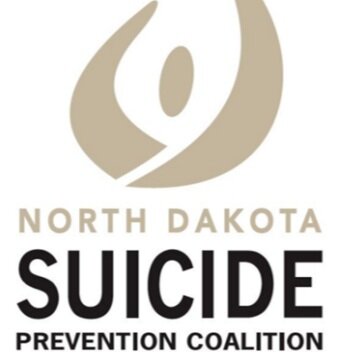Fall 2023 NDSPC Newsletter
Suicide Prevention
Suicide Prevention:
Help Someone Else
If someone you know is struggling emotionally, you can be the difference in getting them the help they need. It’s important to take care of yourself when supporting others through a difficult time, please consider reaching out for support yourself.
Ask the question: “Are you thinking about suicide?”
Keep them safe: assess and help establish immediate safety
Be there: be physically present to support someone or show your support by listening
Help them connect: connect them with the resources they need
Follow-up: check in on the people you care about
There is hope. Most people who struggle with thoughts of suicide do get better.
Help, healing and hope begin with talking about it.
Warning Signs
Some warning signs may help you determine if a loved one is at risk for suicide, especially if the behavior is new, has increased, or seems related to a painful event, loss, or change. If you or someone you know exhibits any of these, seek help by calling the Lifeline.
Talking about wanting to die or to kill themselves
Looking for a way to kill themselves, like searching online or buying a gun
Talking about feeling hopeless or having no reason to live
Talking about feeling trapped or in unbearable pain
Talking about being a burden to others
Increasing the use of alcohol or drugs
Acting anxious or agitated; behaving recklessly
Sleeping too little or too much
Withdrawing or isolating themselves
Showing rage or talking about seeking revenge
Extreme mood swings
What to Say
Talking with and finding help for someone that may be suicidal can be difficult. Here are some tips that may help.
Be direct. Talk openly and matter-of-factly about suicide.
Be willing to listen. Allow expressions of feelings. Accept the feelings.
Be non-judgmental. Don’t debate whether suicide is right or wrong, or whether feelings are good or bad. Don’t lecture on the value of life.
Get involved. Become available. Show interest and support.
Don’t dare him or her to do it.
Don’t act shocked. This will put distance between you.
Don’t be sworn to secrecy. Seek support.
Offer hope that alternatives are available but do not offer glib reassurance.
Take action. Remove means, like weapons or pills.
Get help from people or agencies specializing in crisis intervention and suicide prevention.
Call the Suicide Prevention LIFELINE anytime 1.800.273.TALK (8255)
Contact FirstLink for free confidential help and support 24/7 by calling 2-1-1 or texting your zip code to 898-211
Kevin Hines' Story
If you experience suicidal thoughts, the following post could potentially be triggering. You can contact the Crisis Text Line by texting “START” to 741-741 or by calling the National Crisis Hotline at 1-800-273-8255 (TALK).

